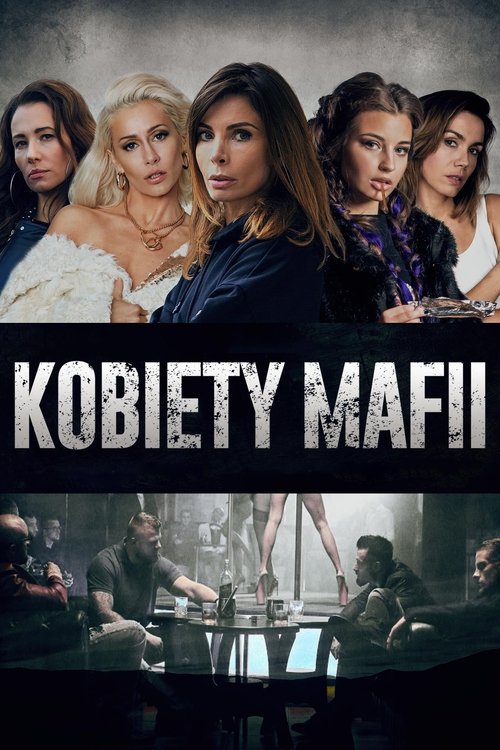
Ask Your Own Question
What is the plot?
In the opening scenes of "Kobiety mafii," we are introduced to a group of women who are deeply entrenched in the criminal underworld of Warsaw. The story begins with a dramatic sequence where a police raid disrupts a drug deal, leading to the arrest of several key players in the mafia. Among them is a woman named "Kasia," who is initially portrayed as a reluctant participant in the criminal activities but is revealed to have deeper connections to the mafia.
As the narrative unfolds, we see Kasia's internal struggle with her life choices. She is torn between her loyalty to her family and her desire for a better life. This conflict intensifies when she learns that her younger sister is being drawn into the same criminal world. Kasia's protective instincts kick in, and she decides to take action to shield her sister from the dangers of the mafia.
Meanwhile, another central character, "Marta," is introduced. She is a fierce and ambitious woman who has risen through the ranks of the mafia. Marta's character is defined by her ruthless determination to gain power and respect in a male-dominated environment. Her storyline intertwines with Kasia's as they both navigate the treacherous waters of the criminal underworld.
A pivotal moment occurs when Kasia witnesses a brutal confrontation between rival gangs. The violence is graphic, showcasing the harsh realities of the mafia lifestyle. This event serves as a wake-up call for Kasia, prompting her to confront her own involvement in the criminal activities. She begins to plot her escape, seeking allies among the other women in the mafia.
As the plot progresses, tensions rise between Marta and her male counterparts. She faces constant challenges to her authority, leading to a series of confrontations that highlight her struggle for recognition. In one intense scene, Marta confronts a male gang leader who underestimates her capabilities. Their exchange escalates into a physical fight, showcasing Marta's resilience and fighting skills. She ultimately emerges victorious, solidifying her position within the organization.
Kasia's plan to escape takes shape when she discovers a hidden stash of money that could provide her with the means to start anew. However, her discovery does not go unnoticed, and she finds herself in a race against time as rival factions become aware of her intentions. The stakes are raised when her sister is kidnapped by a rival gang, forcing Kasia to make a desperate decision to save her.
In a climactic sequence, Kasia teams up with Marta, who recognizes the potential of their alliance. They devise a plan to rescue Kasia's sister while simultaneously confronting the rival gang. The rescue operation is fraught with danger, as they infiltrate the enemy's territory. The scene is tense, filled with close calls and narrow escapes, as they navigate through a series of obstacles.
The confrontation culminates in a fierce showdown between the two gangs. Gunfire erupts, and chaos ensues as both sides engage in a brutal fight. Kasia and Marta display their resourcefulness and combat skills, working together to outmaneuver their opponents. The emotional stakes are high as Kasia fights not only for her sister's life but also for her own redemption.
In the aftermath of the battle, the power dynamics within the mafia begin to shift. Marta's leadership is solidified, and she emerges as a formidable force in the criminal world. Kasia, having faced her fears and fought for her family, decides to leave the life of crime behind. She makes a heartfelt farewell to Marta, acknowledging the bond they formed through their shared struggles.
The series concludes with a sense of resolution for both women. Kasia embarks on a new path, determined to create a better future for herself and her sister. Marta, now firmly established in her position, reflects on the sacrifices made and the cost of power in the mafia. The final scenes leave viewers with a lingering sense of the complexities of loyalty, ambition, and the choices that define their lives.
More TV Shows Like This
Browse All TV Shows →What is the ending?
In the ending of "Kobiety mafii," the main characters face the consequences of their choices and the violent world they inhabit. The story culminates in a series of confrontations that lead to significant losses and a shift in power dynamics within the criminal underworld.
As the narrative unfolds, the tension escalates, leading to a climactic showdown. The main characters, including the fierce and determined women who have navigated the treacherous landscape of organized crime, confront their adversaries. Betrayals and alliances shift, resulting in tragic outcomes for some and a hard-won victory for others. The series concludes with a sense of unresolved conflict, leaving the characters to grapple with their fates and the moral complexities of their lives.
In a more detailed recounting of the ending:
The final episodes begin with a palpable tension in the air, as the women of the mafia, led by the resolute and cunning Kaja, prepare for a decisive confrontation against their rivals. Kaja, who has been a central figure throughout the series, is driven by a mix of vengeance and a desire to protect her family. Her internal struggle is evident as she reflects on the choices that have led her to this moment, weighing the cost of her actions against her loyalty to her loved ones.
Scene by scene, the narrative unfolds with Kaja gathering her allies, each of whom has their own motivations and stakes in the impending conflict. Among them is the fierce and loyal Magda, who has stood by Kaja through thick and thin. Magda's fierce loyalty is tested as she grapples with the potential loss of her own life and the lives of those she cares about.
As the confrontation approaches, the atmosphere is charged with anticipation. The women strategize, their faces set with determination, but also shadowed by fear of the violence that is about to erupt. The camera captures their expressions, revealing the weight of their decisions and the emotional toll of their lives in the criminal underworld.
The showdown occurs in a dimly lit warehouse, a stark contrast to the vibrant life they once led. The air is thick with tension as both sides face off, weapons drawn. Kaja's heart races as she locks eyes with her main rival, a powerful figure in the mafia who has caused her immense pain. The confrontation is brutal, filled with gunfire and chaos, as loyalties are tested and lives are lost.
In the midst of the violence, Kaja's resolve is unwavering. She fights fiercely, driven by the memories of those she has lost and the desire to carve out a future for herself and her family. However, the cost of this battle is steep. Magda, in a moment of heroism, sacrifices herself to save Kaja, a poignant act that underscores the depth of their friendship and the harsh realities of their world.
As the dust settles, Kaja emerges victorious but at a great personal loss. The warehouse, once a battleground, now stands as a haunting reminder of the choices made. Kaja, bloodied and weary, stands amidst the wreckage, grappling with the weight of her victory. The camera lingers on her face, capturing the mix of triumph and sorrow as she realizes that the fight is far from over.
In the aftermath, the power dynamics within the mafia shift. Kaja takes on a leadership role, but the victory feels hollow. The series closes with her looking out over the city, a mix of determination and uncertainty in her eyes. The final shot leaves viewers with a sense of ambiguity, reflecting the ongoing cycle of violence and the complex nature of loyalty and power in the world of organized crime.
The fates of the main characters are sealed in this climactic ending. Kaja, though victorious, is left to navigate the moral complexities of her new position. Magda's sacrifice serves as a poignant reminder of the cost of their lifestyle. Other characters face their own consequences, with some meeting tragic ends while others are left to ponder their choices in a world that offers no easy answers. The series concludes, leaving the audience to reflect on the intricate web of relationships, power, and the relentless pursuit of survival in the unforgiving landscape of the mafia.
Is there a post-credit scene?
In the TV show "Kobiety mafii," produced in 2018, there is no post-credit scene. The series concludes its episodes without any additional scenes after the credits roll. The focus remains on the intense narratives and character developments throughout the episodes, leaving viewers with a sense of closure as the storylines wrap up. The absence of a post-credit scene emphasizes the dramatic arcs and the emotional weight of the characters' journeys, allowing the audience to reflect on the events that have unfolded without any further distractions.
What are the main motivations of the character Maja in Kobiety mafii?
Maja, portrayed as a strong and determined woman, is driven by her desire for power and respect in a male-dominated world. Her motivations are deeply rooted in her past experiences, including her tumultuous relationship with her father and her struggle to assert herself in the criminal underworld. Throughout the series, Maja's emotional state fluctuates between ambition and vulnerability, as she navigates the complexities of loyalty and betrayal.
How does the relationship between Maja and her father influence the plot?
Maja's relationship with her father is fraught with tension and unresolved issues, which significantly impacts her decisions and actions throughout the series. Her father's disapproval and the pressure to prove herself lead Maja to make choices that often put her at odds with other characters. This dynamic adds layers to her character, showcasing her internal conflict as she seeks validation while also striving for independence.
What role does the character of Kaja play in the development of the story?
Kaja serves as a pivotal character who embodies the struggles of women in the criminal world. Her journey from a naive newcomer to a savvy player in the mafia highlights the challenges and dangers faced by women in this environment. Kaja's relationships with other characters, particularly Maja, evolve as they navigate trust and betrayal, ultimately influencing the power dynamics within the group.
How does the character of 'Kowal' impact the storyline and other characters?
Kowal, a seasoned criminal, acts as a mentor and a source of conflict for Maja and her allies. His pragmatic approach to the mafia's operations often clashes with Maja's more emotional and impulsive decisions. Kowal's influence is felt throughout the series as he represents the old guard of the mafia, and his interactions with Maja reveal the generational divide in their approaches to power and loyalty.
What are the key turning points in Maja's character arc throughout the series?
Maja's character arc is marked by several key turning points, including her initial rise to power, her betrayal by trusted allies, and her eventual confrontation with her own moral compass. Each turning point is accompanied by intense emotional turmoil, as Maja grapples with the consequences of her actions and the impact on her relationships. These moments of crisis force her to reevaluate her ambitions and the cost of her choices, ultimately shaping her into a more complex and resilient character.
Is this family friendly?
"Kobiety mafii," produced in 2018, is a Polish crime drama that delves into the lives of women involved in organized crime. The show contains several elements that may not be suitable for children or sensitive viewers.
-
Violence: The series features scenes of physical violence, including fights and confrontations that can be graphic and intense.
-
Crime and Criminal Activity: The narrative revolves around illegal activities, including drug trafficking and extortion, which may be disturbing for younger audiences.
-
Strong Language: The dialogue includes frequent use of profanity and harsh language, which may not be appropriate for children.
-
Sexual Content: There are instances of sexual situations and suggestive themes that may be uncomfortable for younger viewers.
-
Emotional Turmoil: Characters often experience intense emotional struggles, including betrayal, loss, and moral dilemmas, which could be upsetting for sensitive individuals.
Overall, the themes and content of "Kobiety mafii" are geared towards an adult audience, making it less suitable for family viewing.
























